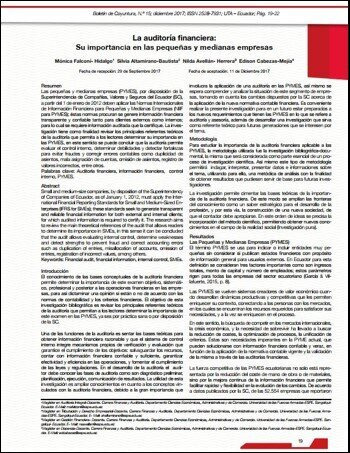The financial audit: its importance in small and medium enterprises
Main Article Content
Abstract
Small and medium-size companies, by disposition of the Superintendency of Companies of Ecuador, as of January 1, 2012, must apply the International Financial Reporting Standards for Small and Medium-Sized Enterprises (IFRS for SMEs); these standards seek to generate transparent and reliable financial information for both external and internal clients; for which audited information is required to certify it. The research aims to review the main theoretical references of the audit that allows readers to determine its importance in SMEs, in this sense it can be concluded that the audit allows evaluating internal control, determine weaknesses and detect strengths to prevent fraud and correct accounting errors such as duplication of entries, misallocation of accounts, omission of entries, registration of incorrect values, among others.
DOI: https://doi.org/10.31164/bcoyu.15.2017.656
URL: http://revistas.uta.edu.ec/erevista/index.php/bcoyu/article/view/656
Downloads
Article Details

This work is licensed under a Creative Commons Attribution-NonCommercial 4.0 International License.
![]()
The publications of the Boletín de Coyuntura are licensed under a Creative Commons Attribution-NonCommercial 4.0 International License (CC BY-NC 4.0). The Universidad Técnica de Ambato retains the copyright of the published works, and favors and allows the reuse of these, as long as: the authorship and original source of publication is cited, and they are not used for commercial or onerous purposes. The intellectual property of the published articles belongs to the authors.
References
Aumatell, C. S. (2012). Auditoría de la información: identificar y explotar la información en las organizaciones: Editorial UOC, S.L.
Cervantes, S., & Yaima, K. (2014). Auditoría Especial al Subsistema de Nóminas de la Empresa Pecuaria Cuenca Lechera, Las Tunas.
Enrique, C. R., Virginia, B. V., & Ramón, G. G. J. (2014). Análisis de estados financieros individuales y consolidados: Editorial UNED.
García, G. H., & Villafuerte, M. F. (2015). Las restricciones al financiamiento de las PYMES del Ecuador y su incidencia en la política de inversiones. Actualidad Contable FACES, 18(30).
Gómez Villegas, M. (2016). NIIF y MiPYMES: los retos de la contabilidad para el contexto y la productividad (IFRS and SMEs: Accounting Challenges for Context and Productivity).
Martínez, Á. M. F., & Ediciones, E. (2015). Contabilidad general con enfoque NIIF para las PYMES: Ecoe Ediciones.
Medina, G. R. (2012). Diccionario Práctico Tributario, Laboral y Societario. Ambato: Pedagógica Freire.
Molina, G. J. S., Herrero, I. S. M., Pérez, M. O., & Lara, L. C. (2014). Fundamentos teóricos de auditoría financiera: Ediciones Pirámide.
Padilla, M. C., & Ediciones, E. (2012). Gestión financiera: Ecoe Ediciones.
Pereda, J. T. (2016). Globalización y regulación contable. Algunos retos para nuestra profesión. Contaduría Universidad de Antioquia (32), 55-120.
Superintendencia de Compañías Valores y Seguros. (2016). Resolución No. SCVS-INC-DNCDN-2016-011. 19.
Superintendencia de Compañías Valores y Seguros. (2017). Ranking Empresarial 2017, from: http://appscvs.supercias.gob.ec/rankingCias/
Tene, J. M., & Castellanos, J. Q. (2015). Papel de la Auditoria de Estados Financieros en las PYMES. Revista Publicando, 2(5), 277-284.
Uribe, R. O. (2016). La información y el control en el proceso contable. Contaduría Universidad de Antioquia (42), 159-171.


